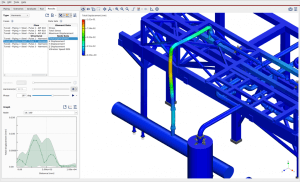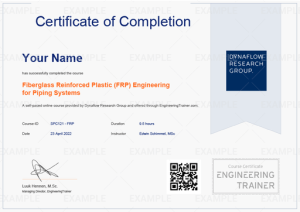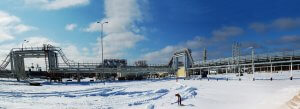
Performing Vibration Measurements: Pipe Stress Assessment
Training Courses Performing Vibration Measurements: Pipe Stress Assessment Free Course Preview Download Brochure About The Course This course teaches you all the fundamentals required for
Fiberglass Reinforced Plastic (FRP) piping, or Glass Reinforced Plastic (GRP) piping, offers a cost-effective alternative to corrosion-prone metallic and non-reinforced thermoplastic pipes. However, designing FRP systems requires specialized knowledge due to fundamental differences from steel piping design.
This course provides comprehensive training in the fundamentals of designing and working with FRP piping systems. It equips you with a solid understanding of material properties and behaviors alongside their impact on designs, covers the engineering process, including pipe stress analysis, and offers numerous real-life field examples to illustrate critical aspects of FRP systems.
The course is comprised of 8 online video modules, with 1-year unlimited access to the course materials and discussion forum for ongoing knowledge refreshment in support of your projects.
Welcome & Your instructors
Content Overview
How to use this course
Questions Forum
FRP Materials and manufacturing
Material specifications of FRP
Manufacturing methods of GRP
GRP Application
Material limitations
Market range
Applications of GRP
A sample of the first module is available for free, so you can learn more about the teaching style and understand if the course fits your needs.
FRP Material properties
Bi-axial materials
Steel versus FRP
Short-term and long-term strenght
Qualification
GRP qualification tests
GRP codes
Overview of GRP codes
Philosophies in GRP standards
Piping code ISO 14692
Stress analysis of FRP systems
Pipe stress analysis
Constructing a stress envelope
Reducing material stress
Surge analysis and flange assessment
Surge analysis for FRP piping
Flange assessment
Buried FRP Piping
Pipe stress analysis
Ring strenght calculations
Material failure theories
GRP material strength
Failure criteria
Ultimate Elastic Wall Stress
Material qualification
Full qualification
Regression
1000 hrs survival test
FRP failure
Longitudinal vs. circumferential cracks
Joint strength and failure in FRP
Joint strength and failure
Flange failure
Failure due to design errors
Failure miscellaneous
Introduction to Fiberglass engineering
Introduction to Modeling Session
Agenda to Fiberglass engineering
Configuration editor in Caesar II
Special execution Parameters
Pipe vendor Engineering Guide Data
Material Properties Input
Pipe vendor Engineering Guide Proces
Pipe Stiffness Parameter Input
Stress Envelope Parameter Input
Pipe vendor input Hydrostatic Design Stress
Long-term Axial and Hoop Strength input
Modeling of Fittings
Pipe Support Span
Load case Set-up in ISO 14692
Interpretation of Results
Flange Check in Caesar II
Euler buckling for Aboveground Pipes
Shell Buckling
Course evaluation survey
Your Personal Certificate
Related resources
Self-Paced
This course is self-paced and is not subject to specific dates. The course contains 8 modules with a total of 9.5 hours of content which can be performed at your own pace. A personal certificate will be provided to you if you finish the course within the first month after purchase. This incentive aims to motivate you to perform the course on time, thereby improving your learning curve.
E-Hybrid
This course is privately scheduled for teams of a minimum of 4 people. A drip feed of modules becomes available to the participants throughout the program. The drip schedule aims to provide consistency to your learning experience and is designed to maintain participant concentration and provide adequate time to perform exercises between live instructor sessions where the instructor may answer any questions about the topic.
This course type is also available for a private schedule for teams of a minimum of 4 people.
Spring Program:
Classroom
This course is scheduled over 3 work days.
This course is available in self-paced, hybrid, and classroom formats.
Prerequisites and level
Intended For
This course is designed for:
Access to the self-paced course
After your purchase is confirmed you receive an account to the EngineeringTrainer online learning portal, where you can find the course in your dashboard. After opening the course you will be guided step-by-step through the different modules. You receive 1-year unlimited access to the course, allowing for the repetition of modules as desired.
Learn by doing
The self-paced and E-hybrid courses are mainly based on video content: video lectures and video software demonstrations. English subtitles are available and videos can be viewed as many times as desired. The video lectures help you to grasp the important technical concepts and in the video demonstrations the instructor uses the software and discusses all the steps and actions. You are recommended to follow the steps of the instructor in the software to optimize your learning curve.
The classroom course is performed in person either on-site or in the Dynaflow Research Group office located in Rijswijk, The Netherlands. This course enables you to be face-to-face with the instructors with live examples provided. This course also provides all participants with a 1-year access to the self-paced course.
Exercises & software models associated with the content are available for download.
Participants of the self-paced and E-hybrid courses receive a personal digital certificate if they meet the following requirements:
Participants of the classroom course receive a personal physical certificate upon the completion of the course.
Example certificate:

After this course, participants are expected to:
Video lectures
Video demonstrations
Discussions forum with other participants & instructor
The majority of training material are videos. These are not available for download, but can be accessed directly with your account on the portal.
You receive 1-year unlimited access to the course. This allows you to perform modules again when you need to refresh knowledge for your work projects.
We encourage participants to submit feedback and questions in the Discussions Forum of the course. These are either answered directly in the forum or form the basis for new videos that are added to the online course on a regular basis.
Participants receive 1-year unlimited access to the course including new videos that are added during this year. Participants receive an email notification upon addition of new course videos.
No technical software is used in this course.
If your computer and internet connection is able to play videos online (YouTube) you will be able to follow the course. Note that almost all browsers are supported, except for Internet Explorer.
Yes, this course qualifies for PDH hours as per the NCEES CPC Guidelines.

Training Courses Performing Vibration Measurements: Pipe Stress Assessment Free Course Preview Download Brochure About The Course This course teaches you all the fundamentals required for

Training Courses Piping: Structural Integrity About The Course Enhance your expertise in addressing technical challenges on a petrochemical plant. Join our introductory level ‘Piping Structural

Training Courses Pipe Stress Analysis Free Course Preview About The Course Pipe stress engineering is a broad area of expertise. To perform a pipe stress
Laan van Oversteen 20
6th floor
2289 CX Rijswijk
The Netherlands
© Dynaflow Research Group BV